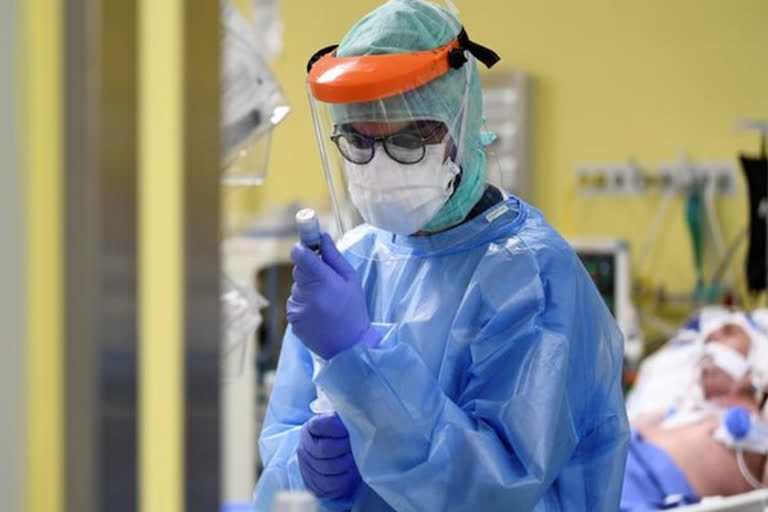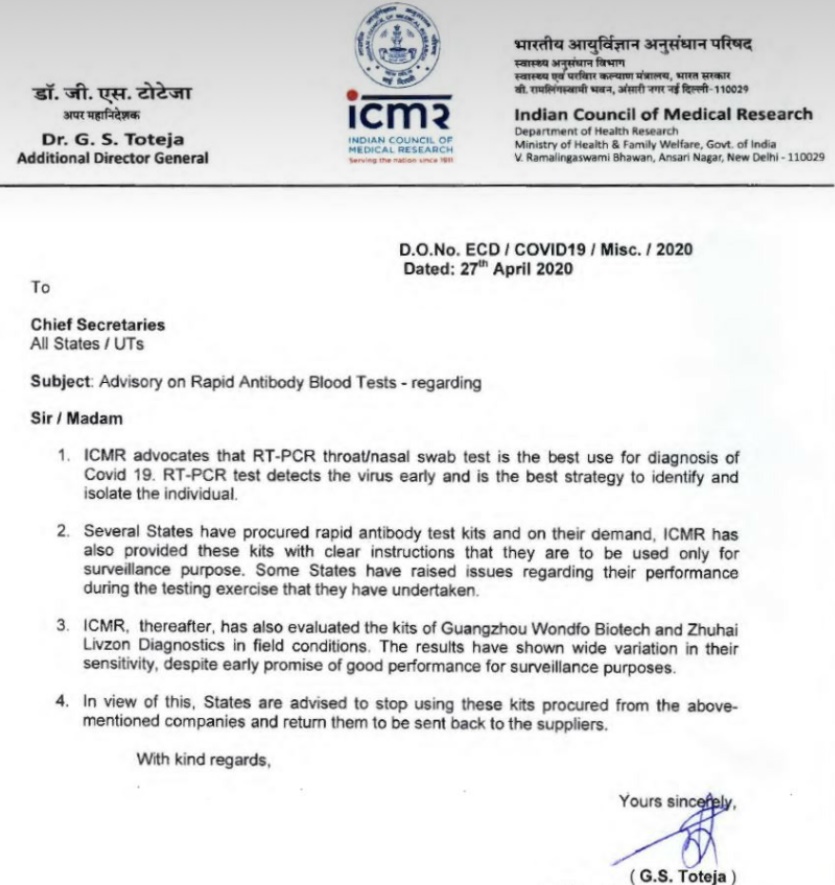New Delhi: In a major development related to COVID-19 testing in India, country's apex medical research institute (ICMR) has decided to stop rapid antibody test after the testing kits were found faulty.
The Indian Council of Medical Research has also decided to return the kits to the two Chinese companies who supplied those kits. The ICMR has also asked the states to return the same.
Initially, earlier last week ICMR has put a hault on rapid anti body tests (mainly used for surveillance and epidemiology investigations) for COVID-19 after a few states including West Bengal has complained about its accuracy. It was in the middle of April, India imported more than five lakh anti body testing kits from two Chinese companies.
"The ICMR evaluated the kits of Guangzhou Wondfo Biotech and Zhuhai Livzon Diagnostics in field conditions. The results have shown wide variation in their sensitivity, despite early promise of good performance for surveillance purpose," said GS Toteja, additional director general of ICMR.
The ICMR in an urgent message to all Chief Secretaries and Secretary Health from States and UTs have advised to stop using these kits procured from the two Chinese companies and return them to be sent back to the suppliers.
"Several states have procured rapid antibody test kits and on their demand, ICMR has also provided these kits with clear instructions that they are to be used only for surveillance purpose," said Toteja.
ICMR advocates that RT-PCR throat/nasal test is the best use for diagnosis of COVID-19. RT-PCR test detects the virus early and is the best target to identify and isolate the individual. As ICMR's decision to stop the anti body testing quickly generates nationwide controversy, Union Ministry of Health and Family Welfare was also quick to respond and came in support of ICMR decision.
"Testing is one of the most crucial weapons to fight COVID-19 and ICMR is doing everything it can to ramp up testing. This requires procurement of kits and supplying them to states. This procurement is being undertaken when globally there is huge demand for these test kits and various countries are applying their full might, monetary and diplomatic, to acquire them," the Health Ministry said in a statement.
ICMR's first attempt to procure this case did not get any response from the suppliers. It's second attempt got adequate responses. Of these responses, taking sensitivity and specificity in mind, kits of two companies (Biomedemics and Wondfo) were identified for procurement. Both had the requisite international certification.
After due process and persuasion, the evaluation committee finalised bid offer of Rs 600 as L-1. Though, ICMR tried to procure these kits directly from Wondfo company it did not materialise due to various clauses including clause for 100 percent advance.
"Hence, it was decided to go Wondfo's exclusive distributor for India for the kit who quoted an all inclusive price for Free on Board (logistics) without any clause for advance," the Health Ministry said adding "this was the first ever effort by any Indian agency to procure such kits and the rate quoted by the bidders was the only reference point."
It may be mentioned here that Government procured 5 lakh testing kits from Aark Pharmaceuticals (distributor) at a costs of Rs 30 crore. After receipt of some supplies, ICMR has again conducted quality checks on these kits in field conditions.
"Based on scientific assessment of their performance, the order in question (Wondfo) along with order in respect of another make found under-performing have been cancelled," the ministry said. ICMR has not made any payment.
"Because of the due process followed (not going for procurement with 100 percent advance amount), Government does not stand to lose a single rupee," the ministry said in its statement. Taking on the development, Lav Agarwal, joint secretary in the Health Ministry said that rapid kits has limited role to play.
"It's basically used for surveillance and epidemiology interventions," said Agrawal.
He said that ICMR brought tender before purchasing followed by proper certificate varification. Question now arises, why Governmnet purchased such kits when their performance were already under controversy.
"The government is taking required action against the company," said Agarwal. It is alleged that ICMR, while purchasing the kits did not consult with a technical joint monitoring group formed by Director General of Health Service (DGHS), an apex technical body. Agarwal, however, said that RT-PCR is the goldstandard for COVID-19 testing.
"Along with available testing kits, we have enough RT-PCR testing laboratories across India," said Agrawal.
The are total 370 testing laboratories across India including 280 government labs and 90 private labs.
The anti body testing kits supplied by China were already under controversy following similar compliant of inaccuracy and variations in testing results from several other countries including Spain, UK etc. However, the pricing issue of the kits has already taken the importer (Matrix) and distributor (Real Metabolocs and Aark Pharmaceuticals) into a legal dispute.
It is claimed that the rapid testing kits were brought by the importer for Rs 245 apiece from China. But the distributors, sold the same kits to the Government for Rs 600 each (much higher than the market price). It may be mentioned here that West Bengal government was the first states who reported inaccuracy and variations in the testing results.




